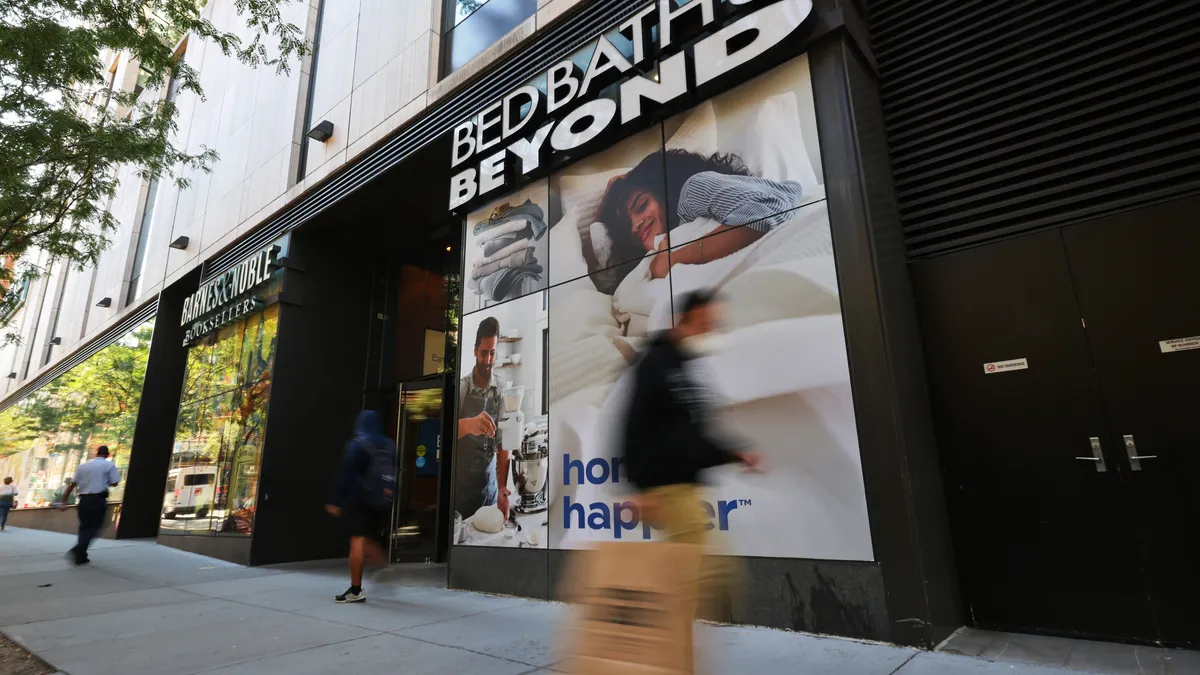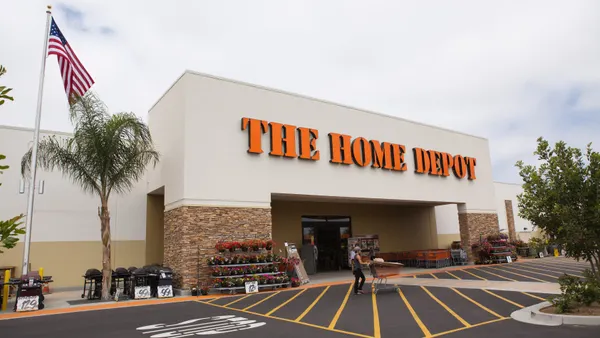Dive Brief:
-
Macy's on Wednesday said that second quarter net sales fell 36% to $3.6 billion from $5.5 billion in the year-ago quarter. Store sales were down 61%, while e-commerce grew 53%, according to a company presentation.
-
Comparable sales fell 34.7% on an owned basis (with digital sales representing 54% of those sales) and fell 35.1% on an owned plus licensed basis, due to faster-than-expected store recovery and better-than-expected e-commerce growth, according to a company press release.
-
Inventory was down 29% at the end of the quarter. The company swung to a net loss of $431 million from a profit of $86 million a year ago, but narrowed its loss from last quarter.
Dive Insight:
As e-commerce takes over during a time of pandemic-induced store closures, Macy's is scrambling to adjust its supply chain to tamp down the added expense of online fulfillment.
In fact, the department store is preparing for a future when 40% of its sales are consistently derived from e-commerce, CEO Jeff Gennette told analysts Wednesday. That indicates that the downsizing earlier this year of Macy's digital teams was probably short-sighted, according to Hilding Anderson, North American retail strategy chief at digital consultancy Publicis Sapient. The e-commerce bump that Macy's is enjoying is down to "execution rather than innovation," Anderson said by phone. "I would characterize them as a laggard in e-commerce, they've been very store focused."
The retailer's websites are benefiting from the fact that the categories in focus for consumers at the moment, including home and beauty, sell well online, according to GlobalData Retail research. Heavy promotions to get customers to spend were "necessary in order to stimulate demand," despite the damage to gross margin, GlobalData said.
Despite the growth in digital, the department store owes much of its recovery in the second quarter to stores reopening. Still, every week, from late June through mid-August, Macy's foot traffic has been down more than 40% year over year, according to location analytics firm Placer.ai.
"Macy's exposure to covered malls and its apparel centric offer have both been unhelpful and have acted as a brake on the return of foot traffic," GlobalData Managing Director Neil Saunders wrote in emailed comments.
In a conference call, Gennette addressed that, underscoring the company's plans, first announced in February as part of its Polaris turnaround plan, to ditch several large mall-based locations in favor of smaller formats in strip centers. Even as he described the digital acceleration, however, he said no more stores have been added to the three-year plan for 125 permanent closures announced.
Those are in addition to the closure of 28 Macy's stores and one Bloomingdale's store early in the year. Gennette said the company plans to expand its Backstage off-price footprint, as well as Boomingdale's outlets.
But Saunders said that, based on GlobalData assessments of several Macy's locations nationwide, consumers are also avoiding Macy's stores because they're untidy and badly merchandised. "Quite simply, if Macy's can't be bothered to make its stores welcoming, why should consumers be bothered to visit them?" Saunders said. "We are deeply critical of senior management which has consistently failed to address this problem and we strongly suggest that Jeff Gennette and his team spend more time visiting stores and talking to associates to understand and solve the issues. Quite simply, there is absolutely no excuse for such sloppiness in retail."
Away from the mall, the department store is suffering from a fall-off in tourism due to the pandemic that has no clear endpoint. Executives also described wariness around the resurgence of COVID-19 outbreaks, which forced stores to reclose in some states, and the government's failure to renew needed stimulus. Amid consumer financial stress, the company is anticipating store card defaults to increase, Interim CFO Felicia Williams said on the call.
For the holidays, Gennette said that "the time between Thanksgiving and Christmas Day is still going to be incredibly important," but that the retailer is preparing for an early start and an elongated shopping season. That will help avoid fulfillment delays and allow stores to accommodate more customers in a COVID-19 environment, when fewer can be present at one time, he said.
















